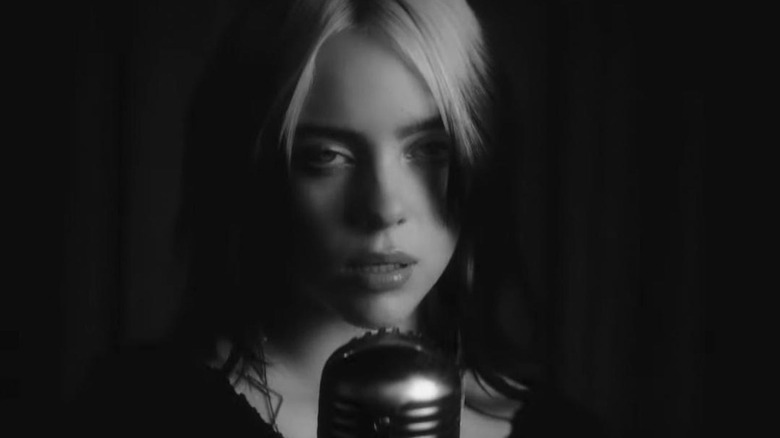
Director Mat Whitecross was handed a large task with "The Sound of 007." The filmmaker, who also directed the hilarious "Oasis: Supersonic," had to tell 60 years of history in a 90-minute documentary. The brisk doc easily could've been a six-hour miniseries exploring the life of composer John Barry or going through all the ins-and-outs of every single theme song. Whitecross didn't have that kind of time, but with the time he did have, he made a documentary that should entertain even the mildest of Bond fans.
The doc is packed with fun facts, creative disagreements, and explores the history of the most beloved and disliked Bond theme songs. Maybe the fact that Prince was a big fan of "Another Way to Die" may not change people's minds about the Alicia Keys and Jack White collaboration in "Quantum of Solace," but still, it's nice to know the song found a fan in one of the all-time greats, who called the song "strong." Whitecross is a fan, too, but he's clearly a fan of all the Bond songs, the good and the bad.
Recently, the director behind "The Sound of 007" talked to us about putting the documentary together, fulfilling a dream for Radiohead fans, and a great Michael Caine story featured in the doc.
'For Every Bond Theme, There's At Least Another Two Or Three People Who've Given It A Go'
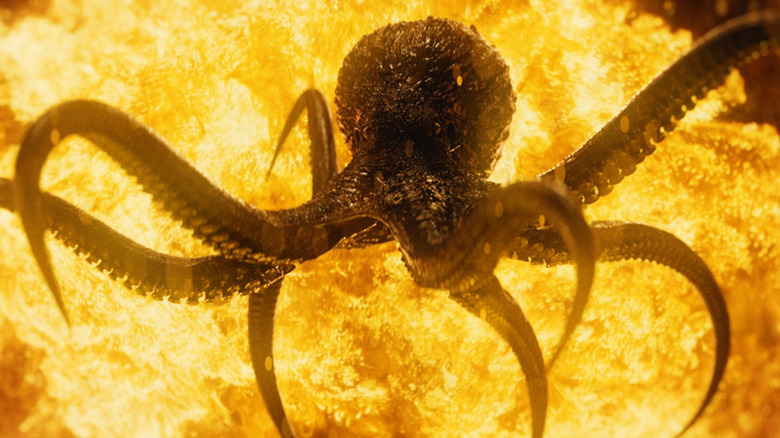
How you doing?
I'm well. I was just listening to the cut Blondie Bond theme [for "For Your Eyes Only"]. I thought that was great.
It is so great. There's an alternate universe where you have Johnny Cash doing the opening of "Thunderball" and you have Frank Sinatra singing "Moonraker." It's great to have these flights of fancy. We tried to do a little bit of that in the film. It's funny -- it wasn't always possible just because of money and rights issues, but I think a lot of people were wondering what it would've been like if Radiohead had their music over the beginning of "Spectre," and there have been a lot of fanboys through the years who complained that Sam [Mendes] and Tom [Newman] didn't use the Bond theme enough in "Spectre" and "Skyfall." It was like, "Okay, well let's just try it out, let's just put it in there when we've got this opportunity to do it," and [EON producers] Barbara [Broccoli] and Michael [G. Wilson] were supportive.
We had the whole Johnny Cash "Thunderball" sequence as well at one point, and in the end we couldn't make it work. Yeah, for every Bond theme, there's at least another two or three people who've given it a go as well and sometimes you listen to them and you're like, "That's pretty good." You can see why they went the direction they did. Normally it feels like they've made the right decision. But I love "Spectre," and I love the Radiohead song as well. It's a great song in its own right.
And you get to show how that song would've played over the opening credits.
It's beautiful, isn't it? And it's funny because I assumed that either on the part of EON or the part of Radiohead, people would've said, "Ah, you know what? It didn't work out." But actually both sides were keen for us to feature it in the film, and it's nice to give it its day. It's absolutely stunning. It's beautiful and it's great that it finally gets a chance to be paraded and showcased in the way it deserves.
As fun as it is, it is obvious to see why Alice Cooper's "The Man With the Golden Gun" was not used.
Yeah, we have it in one of the sequences where it's kind of Bond through the years.
It's a crazy song.
It is nuts, yeah. So, "The Man With the Golden Gun," the one that was used, the John Barry and Lulu version, was considered a misfire by Lulu and by John Barry. In the longer cut of the film, we had a whole sequence on this. Lulu was very disparaging when we met her, and John Barry was very down on it.
My kids -- I've got three young kids -- it's their favorite one and they play it all the time. I said that to Lulu, but Lulu was like, "Yeah, it's a shame, we kind of dropped the ball." I was like, "You're joking, my kids love this song, we play it constantly round the clock at our house." And she's like, "You're joking?" She insisted that I ring my kids right there and she sang it down the lines to them and recorded the video. It was brilliant.
I think there are alternate universes where Alice Cooper's version would've worked. Often it's to do more with the tone of the film rather than the song itself. The songs are perfectly good, or they might be a classic, but somehow they don't just gel with the actual overall tone of the film.
'Just A Bluff, Short Yorkshire Man Who Didn't Like Hollywood Bulls***'
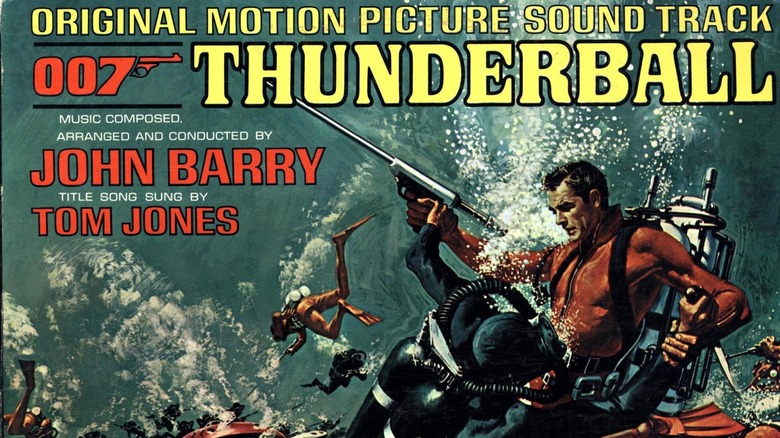
One of the funniest cuts in the doc is John Barry being described as "not a traditional collaborator." You then cut to Duran Duran, and they do not mince words. What was your impression of Barry? Was he a tortured artist or genuinely difficult?
Well, it is funny because when you're going into these films, you kind of have to find a way of threading all this history together. It's not necessarily easy. We knew that we couldn't really go longer than 90 minutes, and we knew we had 60 years to try and cover. So we needed to try and find some consistency, create some structure. And we tried different things. At one point I was like, "Well, maybe it's the story of John Barry and his life, and then we add Bond into it because he was the guy who created the sound of Bond."
I think it probably got too embedded in the biography of John, but we spent a lot of time talking about his history and his relationship with his dad and how his dad was someone who really didn't give him the love that he deserved, and it created this melancholia in him, which I think made him a great artist. It's there. It's in all his music, but it doesn't make you happy in life probably, and so I think he was a little bit tortured.
I think he was also just a bluff, short Yorkshire man who didn't like Hollywood bulls***. If he got put in a situation where he thought someone was being unreasonable, he'd tell them. There's no diplomacy. And it made for great friendships. You can see the friendship he had with [lyricist] Don Black, with [composer] David Arnold. But it also meant that when you stuck him in the studio with someone he didn't like, he would definitely tell them and there might be sparks. Which is very entertaining for people making documentaries, but it probably wasn't that much fun to be around at a certain point.
He spent such a long time on the series. It's just funny to imagine, especially with Duran Duran, the clashes in style that must've happened.
[Laughs] Oh God, it must have been horrendous. But it's funny, though, because a grudging respect came out of that. In the longer cut of the film when we had a three and a half hour cut, we spent a lot of time talking about the relationships, which eventually thawed and there was a kind of respect between the group and him. They once visited him and they became friends and they ended up talking about how they could see that he was kind of a loner. He didn't enjoy playing all the diplomatic games you have to play to become a successful person in Hollywood.
The real test came when A-ha were brought in to do "The Living Daylights," and we had a whole section on that because they really fell out and they end up describing him as the Hitler Youth and a bunch of other things. So yeah, that's when he really had enough.
Again, it was just too much of a good thing. We felt like we couldn't squeeze it all in. When they were watching it felt like it was a bit of a double beat. We spent all this time talking about all the problems between him and Duran Duran, and then here's another young group. It felt like, haven't we just heard this story? So that's why we cut it, but it was great.
Well, I think a lot of people will be glad you kept the Michael Caine story in there.
Oh good. I think what I love about it is just, I have this picture in my head of what the swinging sixties must have been like, where it's like, of course Terence Stamp and Michael Caine and John Barry used to hang out and get drunk. And of course they all were there for the creation of these masterpieces. And of course they were all friends with everyone else. The fact that Michael was kicked out his flat for womanizing and ended up on John Barry's floor, it's too perfect. It had to be true.
And again, that could just be a comedy on its own.
Exactly. There's definitely a film in that.
'People Have Been Riffing On What She Brings To Bond Ever Since'
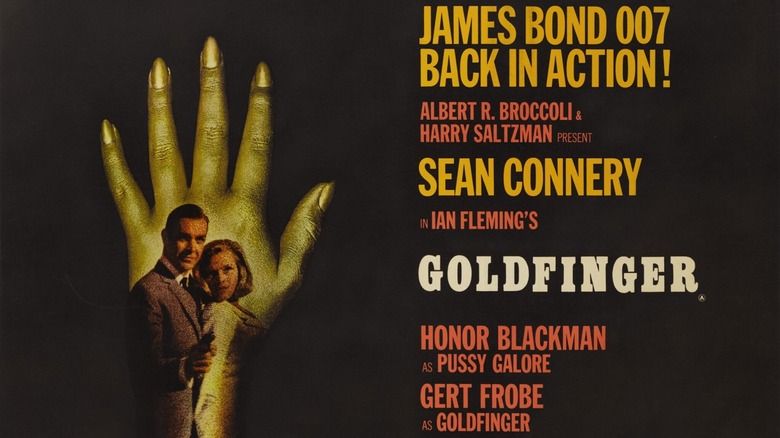
Obviously, we have to talk about Shirley Bassey as well. How important was it to make loud and clear that she established what we expect from a Bond theme?
Yeah, it's kind of indefinable. What is it that makes Bond music? What are the ingredients? We know that they're often torch songs. They're often to do with conjuring up the world of Bond, the world of espionage and danger and sex and violence. The essential ingredients, apart from John Barry's music and those chords and melancholia, is Shirley Bassey. People have been riffing on what she brings to Bond ever since. Don Black describes her -- she doesn't sing a song, she tears chunks out of it and she just gets in there and there's no one else like her.
For me, as a non-musician, even when people are doing their own thing all the way up to Billie and Finneas on "No Time To Die," they're still filtering it through the sensibility of Shirley Bassey. There's an element of Shirley Bassey in Billie's singing. It was the least typical song, I think, for Billie at that point. She talked about knowing that she had to bring it and hit this high note at the end, which is something she'd never done before because that's what Shirley did and that's what you still have to do to this day.
The doc just makes clear, too, how much this world inspires these artists. The fact that Johnny Marr came in to contribute to that track, too, says a lot.
I think so. I mean, it's funny, isn't it, because you wouldn't expect a band, for example, like Radiohead, who tend to be quite serious and they write very melancholy music, to be super Bond fans. Obviously, it was a big deal for them. They wrote not one, but two songs for "Spectre." And the same thing with Johnny Marr -- it doesn't get more gloomy and melancholic than The Smiths, and yet you have Johnny Marr wanting to be part of Bond with Hans Zimmer. Yeah, I love that side of it. It's the Bond fans. You start talking about Bond fans, but actually, just all you're really talking about is human beings. That's all of us, I think.
There's so much variety within that music, so much variety within the films, there'll always be some song that you love. Even if you don't like the John Barry songs, you'll love A-ha. Even if you don't like the more recent songs, you'll go back to those originals. I mean, who doesn't like Louis Armstrong, for example? I think there's enough in there that we're all Bond fans by this stage.
I never considered until the documentary that a lot of artist's artists want to be a part of this major, commercial franchise.
It is crazy, isn't it? We had another longer sequence in the film where we described, it was more of a thing back in the day that for a certain period, even arthouse films, even kind of kitchen sink dramas, would tend to have a title song. But the only film franchise that's still going is Bond. And so, it has this thing, which is kind of bizarre, we don't do anymore, we don't have a title song at the beginning of many other films, but you have it in Bond. It means that there's this whole other artistic dimension to these films, which is completely unique. You see it evolving through the years. It reflects the times around it, but then it's also Bond, so it's kind of timeless. I love that side of things.
'He Probably Had More Freedom Than People Usually Have'
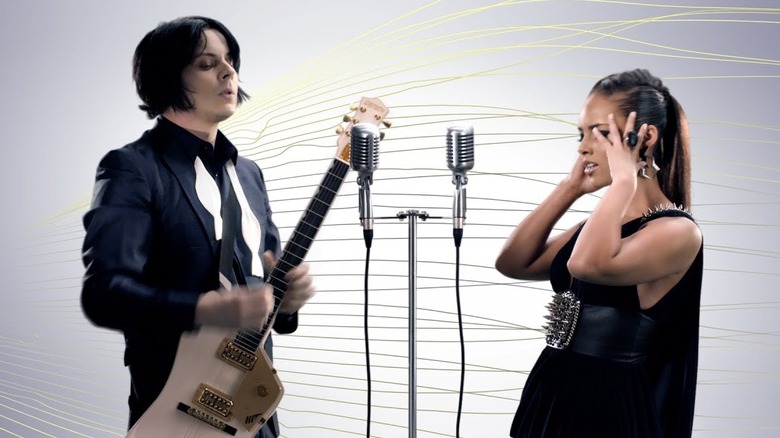
Did you have a lot of access to original recordings and outtakes? For example, was there a lot of unreleased material you got to check out for "All The Time In The World?"
We did get some outtakes. Not everything has survived. We had a whole ["From Russia With Love" theme song singer] Matt Monro section where we described who he was, because he's probably less well-known to modern audiences. There are some great stories about him because he didn't buy into the whole fame and celebrity thing. He was a bus driver who became this incredible singer who was admired by everyone from Frank Sinatra to Dean Martin.
But he smoked three packs of cigarettes a day and drank about two bottles of whiskey a day. You can hear it in those original recordings. They did one pass and then they'd hit the high note and you'd hear him coughing his guts up, going, "Sorry, I'm going to do another one." That was the style at the time. Yes, so we had some of that kind of stuff. We searched more the Shirley Bassey ones, but we found lots of stills.
You find things. You find the Bono demo [for "GoldenEye"]. Even John Barry we had tracks that were embryonic versions of things that he was working on. It's just difficult to squeeze it all in. I mean, the joy for me was when they sent over all the Bond films, they gave us all the tracks. Normally they just send you, whatever, five tracks of Dolby Atmos, but here we'd have 80 tracks to play with so we could isolate certain sequences.
For example, the sequence where Bond gets trapped in the car at the very beginning of "No Time To Die," that sequence, we're like, "Okay, well look, obviously they've mixed it for maximum impact and the sound effects are turned up super high when you're watching it in your cinema, but we're going to pull all that Atmos down and we're just going to concentrate on Hans Zimmer's score and you get a completely different experience." It's really fun to play around with things like that.
Everyone has an opinion on Bond, there were fans who complained that the Bond theme wasn't being used enough in the more modern films. So we took David Arnold's theme and we stuck it over the beginning of "Skyfall" because you go, "Okay, here's a chance for someone to enjoy that. What would it be like if we went back and effectively remixed that film?" You get a chance to play around with this stuff. I assumed someone would say, "Hang on, this is not allowed, you can't mess with Bond," but no one ever did.
Like you said, everyone has an opinion on these songs. It was funny to hear, even though it's such a great song, people criticize the interlude in "Live and Let Die."
Well, I think that was Linda McCartney who wrote the interlude. I think it goes back to my general feeling with Bond, which is I've grown up with these songs, so I can't even remember the first time I heard most of them because they're in my mind from childhood, from before my earliest memories. It is hilarious hearing people's takedowns of certain songs, but for me, I can't ever conceive that song being in any other shape or form. I can't even conceive of it being written. Paul McCartney says, "I had an idea for a Bong song, so I wrote it in the afternoon." I just can't conceive of there not being that song and then there being the song. It's madness. But that's what happens when you're a genius.
You also cover how unpopular the Alicia Keys and Jack White song was for "Quantum of Solace." Personally, I'm a fan.
Me too.
Was it true, though, when Jack White said he wanted to try out a crazy guitar solo that the producers would never have time to say no?
Yeah. Basically what happened was, they spent a long time trying to make it work with Mark Ronson and Amy Winehouse, so they had kind of run the clock down, that was my understanding. So they had a limited amount of time to think too hard about what they would do. The way that [director] Marc Foster and Jack White were talking about, the deadline is completely immovable, it's approaching like a freight train. And so, whatever Jack White created was what was going to be in the film.
I'm the biggest Jack White fan on the planet. I loved The White Stripes. I love Jack White on his own. So when that song came out, I was bowled over by it and I still listen to it a lot. But it was funny, I mean, he was saying it in a slightly tongue in cheek way, but he did know there was no plan B. I think at that stage it was like, "It's either going to be Jack White's version or we are going to have no opening credits." So he probably had more freedom than people usually have.
And Prince was a fan. Again, a lot of people bag on it, but it kind of has that lean and mean feel to it that the movie does.
Definitely. It's really rocking. It's a great tune that I would listen to regardless of whether it was a Bond song or not. Yeah, quite an unusual choice. It's very different presumably to what Amy Winehouse and Mark Ronson would've done, but I loved it. It's a little bit different. It's a duet. You've got the back and forth of a male and female vocal.
Again, what I like about the whole process of people writing Bond songs is that there's a certain framework, but it's so indefinable that it's wide enough that it can encompass Madonna and techno and lounge music and new wave and rock and roll. But they've also somehow got to be Bond. For me, it's great. It'll be interesting to see what happens next. It's not inconceivable to me that they would get a hip hop artist to do the next one.
"The Sound of 007" is now streaming on Prime Video.
Read this next: The 20 Greatest James Bond Villains Ever
The post The Sound of 007 Director Mat Whitecross Explores the History of Bond's Theme Songs [Exclusive Interview] appeared first on /Film.
0 Comments